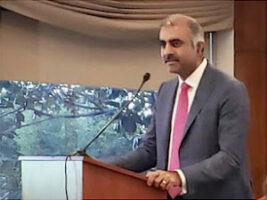The greatest show in the world, the football World Cup in Brazil has just come to an end. It has been 5 weeks of relentless passion, skill and drama that has kept so much of the world enthralled and mesmerized. When 32 of world’s best teams battle against each other in a fiercely competitive tournament, it produces not just riveting drama but also many life lessons. I thought I will draw some management lessons from the recent World Cup that business leaders and organizations could benefit from. Here are eight lessons that I would like to share with you:
- Team over Individual brilliance. We are naturally drawn to individual brilliance, the mesmerizing runs of Lionel Messi, the skill of Neymar, the power of Cristiano Ronaldo. However, in the end when it was a match between the best team and the best player of the tournament, the best team won. Individual brilliance is important. Messi did play a crucial role in leading Argentina to the final but he did have a solid defense to support him. While the great Ronaldo could not carry a poor Portugal team even from the Group stages. This is a great learning for organizations. We often tend to focus on the charismatic leader. The leader is important but it is the team that is even more important.
- Youthful energy over Reputations. Spain came to the tournament as the reigning World and European Champions and their clubs had dominated European Champions League. However, they suffered two humiliating losses and bowed out from the Group stages. Their problem was resistance to change. They failed to evolve their ‘tiki taka’ style and went with the reputation of their ageing stars ignoring the young talent on the bench, and ultimately and paid the price. Unlike them young teams like Colombia dazzled the World Cup with their youthful energy and creativity. Similarly in business, you cannot rest on past laurels and old strategies. There are always younger, more creative competitors who can surprise you.
- Mere emotion and good intent is not enough. Brazil came into the tournament riding a tidal wave of national pride and expectations. The passion at display while singing their national anthem beginning of each match showed unmistakable intent. The emotion and spirit carried them through the Group stages and early rounds but they suffered the most humiliating defeat in the semi-finals. They were found out. They were not good enough. Emotion can give you energy, but if it is not backed by capabilities you can fall flat. In the business world; often leaders lead by vision and slogans, but organizations cannot succeed unless the vision is backed by clear strategy and execution.
- Success takes time and planning. Most members of the victorious German team had come through their famous youth development program. Many of them were part of the under-21 European Championship winning team in 2009. The same team had lost in the semi-finals of two previous World Cups and the last European Championship. Yet, they persisted with their coach Joachim Loew for 7 years. Finally they won the biggest prize in 2014. This clearly shows that success is not immediate. It takes time and planning. You often have to face multiple failures and need to have the strength and foresight to persist through them. This is a lesson we often forget in the business world. We often have expectations of immediate results and equally lose heart at the first failure. We should learn from the German team!!
- Backline as important as the Frontline. This World Cup was dominated by Goalkeepers. Manuel Neuer of Germany, Ochoa of Mexico, Tim Howard of USA and Navas of Costa Rica emerged as the biggest stars for their teams. Moreover in the final few matches, the defender Mascherano outshone the talismanic Messi for Argentina, and Bastian Schweinsteiger was the heroic man of the match in the finals. Newspaper headlines and public imagination is captured by dazzling forwards and goal scorers. However, matches are often won or lost by the defense. There was no better example of this than Brazil’s famous capitulation against Germany!! Even in the business world, it is the “frontline” staff in sales and marketing that are often the heroes. However, we need to recognize that the “back-office” plays an equally important role in a company’s success.
- Bench strength is crucial. This World Cup saw more goals by substitutes than ever before. The final was won by a wonder goal from the substitute Mario Goetze who scored from a pass by another substitute Andre Schurrle. Germany was able to shrug of the loss of the influential midfielder Sami Khedira just before the match and his replacement Christoph Kramer early in the match to still go on and dominate the mid-field. On the other hand, Brazil had pinned all their hopes on Neymar and suffered a meltdown when they lost him in attack and Thiago Silva in defense. Another interesting example of leveraging the bench was the Dutch bringing on keeper Krul for the penalty shootout highlighting the importance of specialist skills. Clearly the team that had the strongest squad not just the starting 11 won. Similarly, in the business world we cannot rely on a few stars. Succession planning and talent development is critical for having a pipeline of leaders who can step in at short notice.
- You can make the best of limited means. Costa Rica were the surprise package of the tournament. A country of only 4.5 million people with few players in the top football leagues. Yet they won their Group that included three former world champions in Italy, Uruguay and England. They only lost narrowly in the quarter finals on penalties to the powerhouse Netherlands. They had a simple, focused strategy that they executed perfectly – rock solid defense and then fast counter attack. This shows that you can produce great results with limited means. Even in business, it is not the company with the most resources that wins. Sometimes limited resources makes you think harder about your strategy. A clear, narrowly focused strategy executed well can work wonders!!
- Margin of error is small. The greatest competition in the world was won by a solitary goal in the final 7 minutes of the extra time. After flurry of goals in the Group stages, most matches in the knockout rounds were won by solitary goals with 4 being decided in extra time and 4 going to penalties. Germany came into the finals as the clear favorites. Yet Argentina gave them a great fight and probably had the better chances. Clearly the margin between a glorious win and despairs of defeat is very low. This means that you have to absolutely bring your best form and strength of character into every match. Moreover, you have to acknowledge the importance of luck. Therefore, there is no place for arrogance or hubris in sports at the highest level. This is a great lesson for all of us in business. Most industries face immense competitive pressures. No company can afford to be complacent and has to be at its very best to win in such a competitive environment.
Sports is one of the finest expressions of human endeavor and teaches us a lot about success and failure, teamwork and leadership, strategy and execution, courage and character and much more. I hope the above learnings are helpful and you can apply them in your teams and personal leadership journeys.
All the best!!



